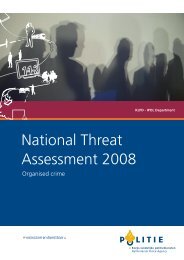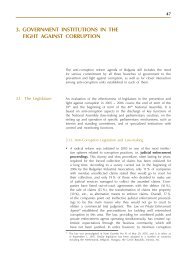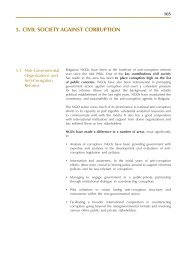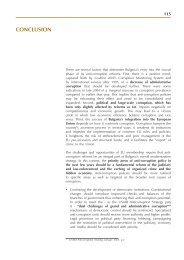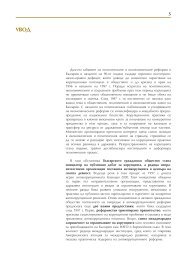Assessing the Effectiveness of Organized Crime Control Strategies ...
Assessing the Effectiveness of Organized Crime Control Strategies ...
Assessing the Effectiveness of Organized Crime Control Strategies ...
You also want an ePaper? Increase the reach of your titles
YUMPU automatically turns print PDFs into web optimized ePapers that Google loves.
Beare (1996:26) notes that insiders’ accounts <strong>of</strong> criminal organizations can yield a great deal <strong>of</strong><br />
useful information about <strong>the</strong> structure <strong>of</strong> <strong>the</strong>se organizations, <strong>the</strong> nature and changes in <strong>the</strong>ir<br />
operations, <strong>the</strong> motivations <strong>of</strong> members, and <strong>the</strong> extent to which legislation may have<br />
encouraged insiders to tell <strong>the</strong>ir stories. Never<strong>the</strong>less, <strong>the</strong> veracity <strong>of</strong> <strong>the</strong>se accounts must be<br />
carefully assessed. Ianni (1972), for example, was said to be co-opted or deceived in his study <strong>of</strong><br />
<strong>the</strong> Lupollo crime family. Critics argue that <strong>the</strong> family concealed from Ianni some <strong>of</strong> its most<br />
serious activities, such as heroin distribution and violence (Beare,1996:25). The value <strong>of</strong><br />
information provided by insiders is also dependent upon <strong>the</strong>ir location within <strong>the</strong> organization, as<br />
just a few members understand how <strong>the</strong> entire operation works (Reuter, 1983).<br />
Reuter also asserts that existing materials are limited by <strong>the</strong>ir nearly exclusive focus on <strong>the</strong><br />
Italian Mafia and on <strong>the</strong> settings <strong>of</strong> Chicago and New York. O<strong>the</strong>r groups need to be considered<br />
in discussions <strong>of</strong> OC. Reuter contends that even in <strong>the</strong> case <strong>of</strong> <strong>the</strong> Mafia, we still await a solid<br />
understanding, as scholars have for long been embroiled in a sterile debate as to its existence,<br />
ra<strong>the</strong>r than its strength, durability, and uniqueness. Fur<strong>the</strong>rmore, much <strong>of</strong> what we know about<br />
<strong>the</strong> Mafia is based on <strong>the</strong> word <strong>of</strong> Joseph Valachi, OC’s most notorious informer (Block,<br />
1994:3).<br />
The reliability <strong>of</strong> information on OC provided by law enforcement agencies has been <strong>the</strong> subject<br />
<strong>of</strong> considerable academic debate. These agencies have faced <strong>the</strong> criticism that <strong>the</strong>y have<br />
developed a fixed conception <strong>of</strong> OC (Beare, 1996:29). This conception is that <strong>of</strong> an “alien<br />
conspiracy”, with OC viewed as being predatory and as corrupting society, while discounting <strong>the</strong><br />
role <strong>of</strong> citizens who seek illicit goods and services, as well as <strong>of</strong>ficials who may collude with<br />
criminal groups. Critics contend that police intelligence work and <strong>the</strong> interpretation <strong>of</strong> data<br />
generated is shaped by this conception.<br />
In <strong>the</strong> 1960s and 1970s, for example, US law enforcement agencies believed in <strong>the</strong> existence <strong>of</strong> a<br />
national Mafia criminal conspiracy. This belief was said to produce a self-fulfilling prophecy,<br />
whereby <strong>the</strong> focus <strong>of</strong> police turned to Italian-American crime families. The predictable result<br />
was that most criminal cases were Mafia-related (Beare, 1996:30). The view <strong>of</strong> OC as somehow<br />
alien to society, ra<strong>the</strong>r than as a byproduct <strong>of</strong> <strong>the</strong> weaknesses and vices <strong>of</strong> its members, is also<br />
said to serve <strong>the</strong> interests <strong>of</strong> police agencies by promoting <strong>the</strong>ir pursuit <strong>of</strong> additional resources.<br />
Ano<strong>the</strong>r concern is that <strong>the</strong> lack <strong>of</strong> sufficient data on OC has compelled scholars to rely<br />
excessively on government documents, many <strong>of</strong> which have also historically adopted a<br />
conspiratorial view <strong>of</strong> OC (Galliher and Cain, 1974). One scholar, for example, argues that <strong>the</strong><br />
work <strong>of</strong> royal commissions and inquiries into OC is <strong>of</strong>ten superficial and driven by a political<br />
agenda: <strong>the</strong> need to relieve “a politically defined, media-generated crisis” (Beare, 1996:33).<br />
Overall, it has been argued that <strong>the</strong> over reliance on <strong>of</strong>ficial sources <strong>of</strong> information has impeded<br />
<strong>the</strong> development <strong>of</strong> independent scholarship in this area. For <strong>the</strong>ir part, law enforcement<br />
agencies have been reluctant to release information that might compromise <strong>the</strong>ir operations or<br />
<strong>the</strong> safety <strong>of</strong> <strong>the</strong>ir <strong>of</strong>ficers (Auditor General <strong>of</strong> Canada, 2002).<br />
The media can be fruitful sources <strong>of</strong> information on OC, due to <strong>the</strong>ir international scope, focus<br />
on current issues, and <strong>the</strong> investigative skill <strong>of</strong> many journalists (Beare, 1996:34). Journalists<br />
have figured prominently in <strong>the</strong> limited Canadian literature in this area. Prudence must be<br />
Research and Statistics Division / Department <strong>of</strong> Justice Canada | 11



